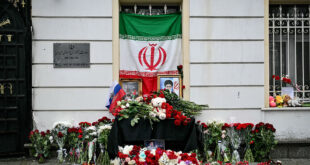UNITED NATIONS (AFP) — The UN Security Council opened a debate Thursday on Middle East tensions ahead of the planned Israeli withdrawal from the Gaza Strip, with Israel and the Palestinians clashing over Israel’s West Bank separation barrier.
As Israel indicated that the Gaza pullout, due to begin in mid-August, could be moved forward in a bid to avoid further protests by opponents, the council heard a briefing from UN Special Coordinator for the Middle East Alvaro de Soto.
But the debate which had initially been scheduled to centre on “the situation in the Middle East, including the Palestinian question,†was overshadowed by a clash over Israel’s July 10 decision to approve a revised route for the West Bank separation barrier around East Jerusalem that is to be completed by September 1.
Somaia Barghouti, the representative of Palestine’s UN observer mission, called the move “a grave development and a flagrant challenge to the international community.”
The path of the revised barrier route will cut through two Palestinian neighbourhoods, leaving some 50,000 Palestinian residents of annexed East Jerusalem on the West Bank side of the barrier.
The status of Jerusalem is one of the key issues of the Middle East conflict, and Arab countries requested a Security Council debate on the issue.
“The Israeli government is exploiting the desire of the international community to see the success of the (Israeli) withdrawal from Gaza to accelerate the creation of facts on the ground, to impose a fait accompli which is illegitimate and based on the attempt to undermine the possibility of creating an independent, sovereign Palestinian state” along the 1967 borders, said the Palestinian representative.
In an immediate rejoinder, Israel’s UN Ambassador Dan Gillerman denounced what he called a “pernicious attempt to hijack (the council’s) mandate and actions.” “We call upon this council to look beyond this diversion and witness the larger picture, a tiny country, marred by terrorism, mobilising its citizenry and political will to take a bold step for peace in the region,” he said.
France’s UN Ambassador Jean-marc de la Sabliere called on Israel “to stop all construction of the wall within Palestinian territories, including around East Jerusalem” in accordance with international law.
“The European Union will not agree to any non-negotiated modification of the (1967) border lines,” he added.
De Soto meanwhile stressed the importance of the Israeli withdrawal from Gaza.
“Disengagement is an important step forward: Withdrawal from occupied territory, albeit partial and on terms largely set by the occupier, is a positive, precedent-setting step, and one that the entire international community cannot but support,” he said.
He noted that the Middle East Quartet, which groups the United States, Russia, the European Union and the United Nations, “condemned the upsurge in violence in Gaza and urged both parties to avoid and prevent any escalation in violence, so that the Israeli withdrawal could proceed peacefully.”
The Quartet is the main sponsor of the Mideast peace “roadmap,” which seeks the creation of an independent Palestinian state alongside a secure Israel. It has made little progress since its launch in June 2003.
Deploring what he called “the suspicion and cynicism” that bedevil Israeli-Palestinian relations, de Soto said: “It is of paramount importance that stability be preserved and that the Palestinian Authority be empowered to successfully counter militancy and extremism,
He called on Israel to do more to support the Palestinian Authority in its bid to rein in the factions.
Several delegations, including Britain, Russia, China, Denmark and France, also urged Israel to show maximum restraint and to stop extrajudicial killings while recognising the right of the Jewish state to protect its citizens from attacks.
 Eurasia Press & News
Eurasia Press & News



